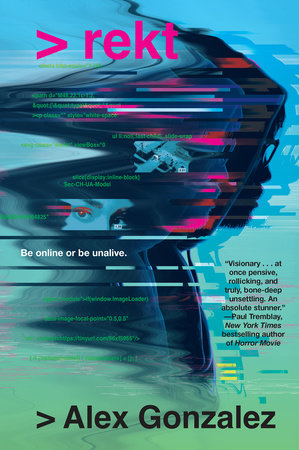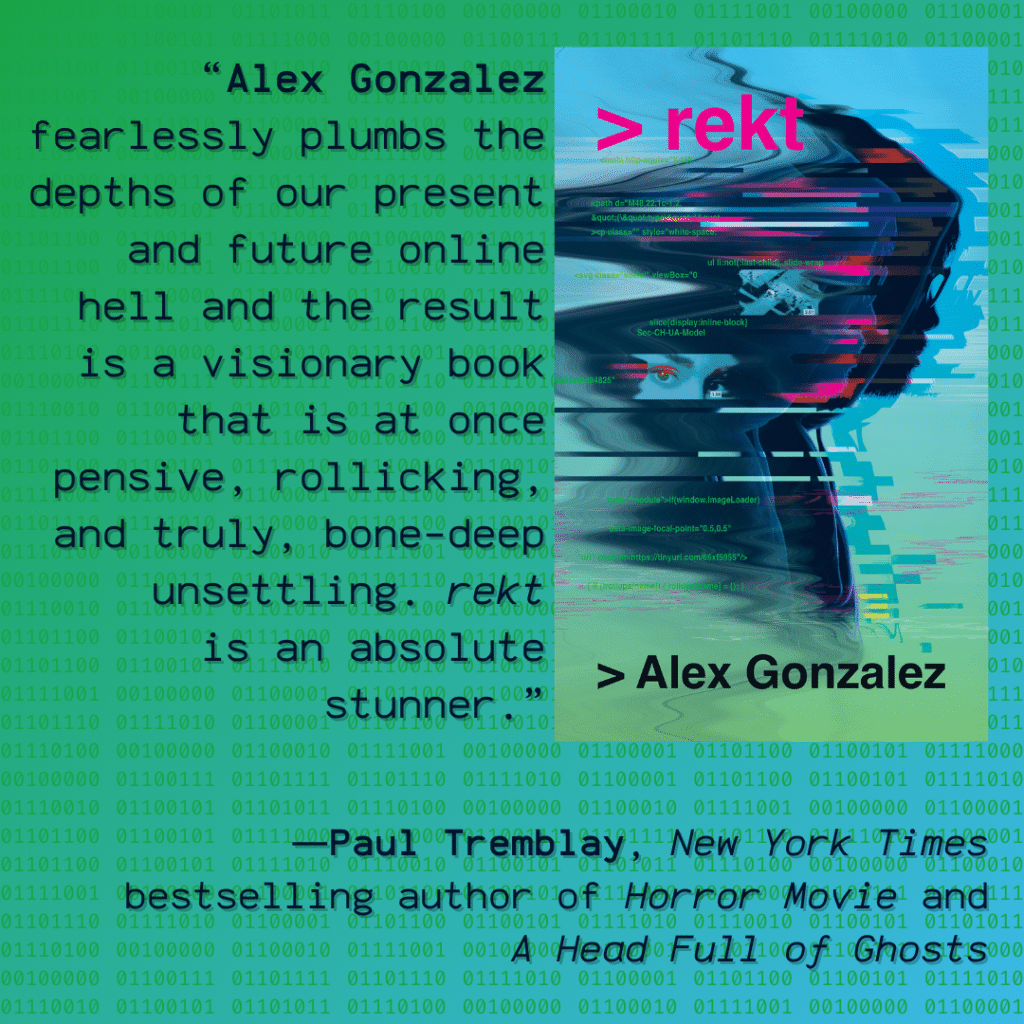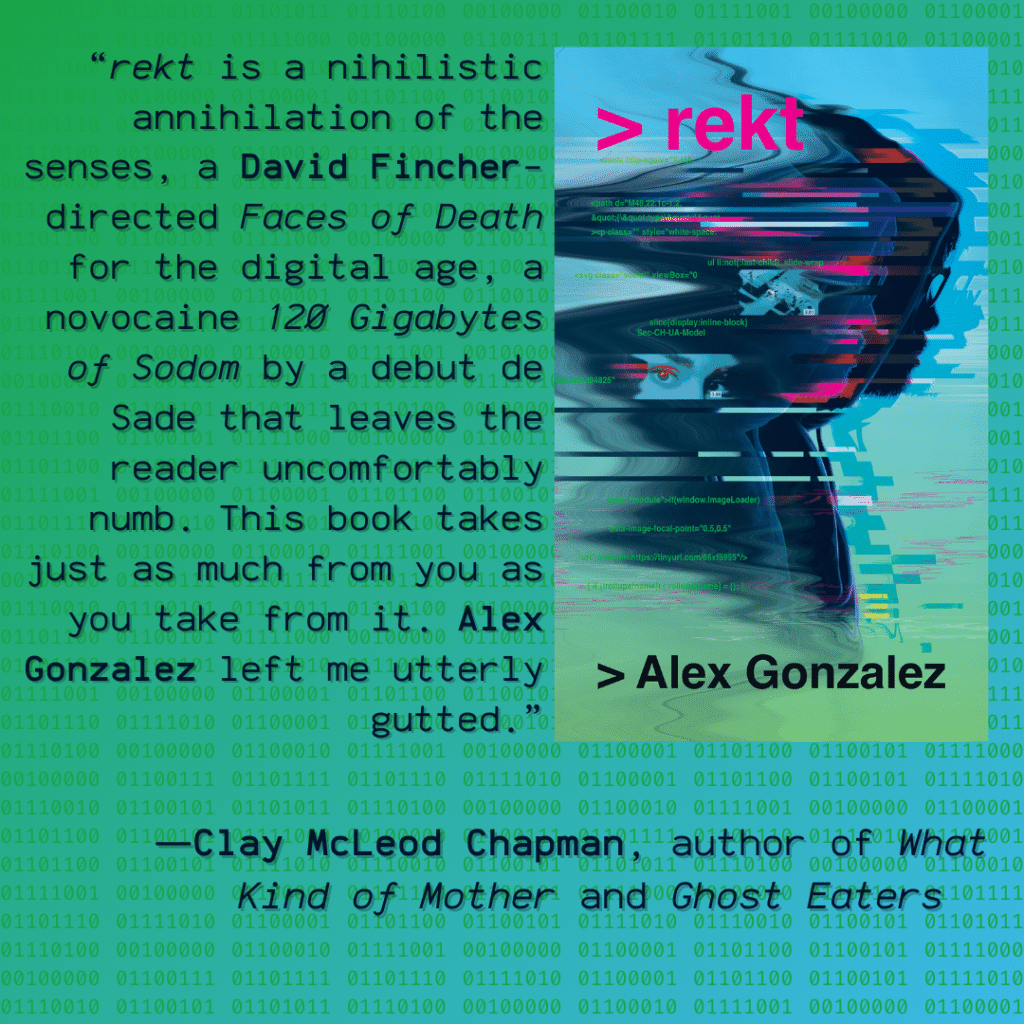
get rekt:
An interview with Alex Gonzalez
Our Editor-In-Chief John Hanley recently talked with Rekt Author Alex Gonzalez about his novel and what it means to write horror in the Internet age. Check out the full interview below, and buy the book here.
Alex Gonzalez‘s rekt (March 25, 2025) explores an inky blot of trauma-induced isolation, in which protagonist Sammy is subsumed by the Internet’s ultra-violent basement until his loneliness and fear emerge into rabid violence. A creepypasta crawling from the screen, and a fresh and innovative take on digital horror, this novel is a must-read for anyone who grew up on the Internet.
You can also give a visit to Gonzalez’s own horror zine, You Are Not Alone, full of stories (written by Gonzalez and his brother Taylor), recordings, and more.

On the Internet…
The beheading video mentioned in the beginning of the novel immediately recalled my own middle school years, when rumors circulated of particularly violent or disturbing videos. With that in mind, I’ll ask the most obvious question first: what were the infamous creepypastas/videos that you remember from your childhood? Did you witness or hear about anything that really shook you, and did you find yourself disturbed or wanting more?
I was born in 1994 so the video I was referencing in the cold open might’ve been the Taliban. I remember it being too early for Al-Qaeda or ISIS to be on the scene. It was floating around the same pages as “one guy, one jar”; “two girls, one cup”; and Pain Olympic stuff. But the one that really affected me was a video called split face. I mention it in the book as well. A kid jumps from a bridge into the river but doesn’t quite clear the concrete support beam. He bashes his head open, splashes into the water, and a bright cloud of blood forms. Then (inexplicably, the video was edited) it cuts to an overhead shot of doctors trying to hold his face together. I remember vividly how hopeless it was. The doctors were so overwhelmed with it; they were almost nonchalant. It was like they were trying to pinch together a telephone book that kept opening. I think any real head will tell you, the ‘habit’ just happens upon you, and it never goes away. It’s just something you can feed but never should. That said, even now at 30, in the dark hours, I might click a link or two just to see what’s out there. I always regret it, though.
rekt seems to play around in the liminal space between Internet and reality. The Internet isn’t real life but at the same time, it very much is. That blurriness pairs well with Sammy’s descent into quasi-psychosis, and the entire “deepfake”/AI concept. Can you talk a little bit about this interplay – how you’re thinking about it, and its broader societal impact, particularly in a horror context?
I wouldn’t go so far as to my call myself a transhumanist or a tech accelerationist, but I’m more of a Pandora’s box pessimist. There’s just no going back. The internet is real life and, not only that, but you have to be online, and guess what, the Internet also has ideas for who you’re supposed to be. When Sammy meets the Skunk, the Skunk tells him pretty flatly: you can leave IRL behind. In other words, it doesn’t matter how cruel or sadistic you are to flesh and blood people. If you have a community that exalts you online, you’ll come out unscathed.
In the context of fiction, it’s the next step of God is Dead. God is dead because people don’t need religion anymore to make moral decisions, but if you have an entire universe in your pocket – and I mean, literally, a universe – and that community of people is skewing your perspectives, your identity, and your belief system so much that it has tangible, real-world effects IRL, then how can online not be real? I’m not much of a Nietzsche reader but I think the rest of that idea is that God is dead and so we took His place, but now the Internet has taken our place.
In this specific horror, it’s similar to Hellraiser. We played with a box that opened up to another dimension where the rules are different. Very scary! And horny, too!
You don’t often see a novel lean so thoroughly into Internet culture, even as it has become ubiquitous. Because it moves so quickly, many writers seem averse to incorporate too much modern technology or Internet culture into their writing, perhaps for fear of it feeling “dated” a few years later. But it feels impossible not to write about the Internet now, especially when writing the present day. Do you have any philosophy, strategy, and/or advice when it comes to writing about the Internet?
This was definitely something I grappled with a lot during the conception of the piece, but once I committed, I had to lean in all the way. At first, I understood the fear of “dating” your piece but then I thought more about it. Every piece is dated really. Whether it’s the turns of phrase, the politics, the fashion, the setting, the cars they drive, the things they fear. Even reading early Stephen King feels like something closer to a time portal than more intentional 80s throwbacks. You have to write what you know and that should certainly include culture and sub-cultures and jargon and inside jokes. It’s true that the Internet happens fast and I’m aware that one chapter named “Goblin Mode” is already outdated, but I think it’s more important to chronicle the time you’re in instead of make something “evergreen.” Additionally, since I was attempting to target a super niche demographic – Zillenials who grew up watching snuff films and creepypastas – being coy and mealy-mouthed would’ve scrambled the story or, worse, betrayed the reader.
All that being said… It’s still impossible to write emojis. It’s cringy, it’s weird, it’s unnatural, and I’ve never seen it done well. So and so sent a cherry emoji? So and so sent a GIF and lmao’d? Ugh. Hideous!
A great aspect of rekt is that it seems to portray an ethnography of the Internet itself – there are fractures and corners that some people get sucked into, to which others are completely oblivious. What kind of research were you doing for this novel? Did you go rooting around the Internet, was it based on memories of your own, or was it more speculative?
Unfortunately, it’s based on some real memories and some real dark deep dives. On that note though, all of the stuff Sammy engaged with had to be relatively on the same wavelength as him. He’s not getting access to the Pentagon, he’s not a “hacker” really, he’s maybe QAnon leaning but even that’s a stretch. All of the communities he was a part of needed to level up, so to speak. Creepypastas share scary stories. 4chan boards share rekt videos. Chinsky shares AI videos. So on and so forth. I think the danger, ironically, is the sense of community. When you first see a rekt video you might recoil initially. But when you see others casually sharing them and commenting on them, your knee-jerk reaction will change. They’d smile, calm you down, pull up a chair for you, and then you’re suddenly sharing videos too. The sense of belonging seems to supplant what the group actually does.
Funny enough, though, I’ve never used the dark web. It scares me too much. And a large number of awful things are right there on the regular web anyhow.

“I pretty much hate [the Internet]. I think it’s net evil. And I say that as someone deeply online and deeply in the trenches of it.“
The Internet mostly seems to be a force for evil in this book. Characters do use it to seek community and connection, but more often than not find themselves even more isolated/unwell than before. In 2025, how are you feeling about the morality of the Internet – net positive, net evil, net neutral? Amoral?
I pretty much hate it. I think it’s net evil. And I say that as someone deeply online and deeply in the trenches of it. I’m not some monk that has given up the apps and can freely touch grass. I’m on the apps, I’m constantly Googling myself, I’m a total net-cuck. And it sucks! I think algorithms, AI, SEOs, and data harvesting will ruin us all. There was this idea someone else said (I’m too dumb to remember their name and too lazy to look it up) but it was like we all expected social media to connect us, but it really just enhanced our differences and gave everyone pitchforks. Moreover, we have this delusion that the head honchos and CEOs that drive this innovation are doing it out of some philanthropy that will benefit humanity and its ‘users,’ but that has yet to be the case. Every time we find a new app, social media, or website, it’s later revealed that it was up to some nefarious, inscrutable back dealings – stuff that doesn’t even make sense in its evilness – like the FaceTune app was trading data for Bonobo pelts. What are we doing here!
Do you have any hopes or expectations for the analog/Internet horror subgenre, as technology evolves and the genre picks up steam? Any pet peeves, things you love, or opportunities for further digging within this subgenre?
I don’t know what to expect from Internet genre writers. I’m always impressed, though. The things that get me excited are the things that are for nobody. The things that are almost never advertised. The blogs or websites that you uncover that have a massive backlog of posts and stories. When you chip away at something that’s not commercially viable, then you’re doing it for the love of the game, and I have immense respect for that. But what’s fun about Internet horror is that, because it moves so fast, there’s a punk energy to it. By the time publishing houses scoop up some viral NoSleep story or adapt some YouTube short, the community will be on to the next thing. That’s how the genre will be pushed forward. My pet peeve is when creators mimic each other’s viral posts. Stop trying to make “Lights Out”, stop writing the same NoSleep posts about rangers in the woods, stop adding crappy VHS static FX, it’s already old news!
On the Book…
As much as Sammy makes a lot of bad choices and often rejects help, much of this novel also portrays a failure of the institutions and support systems on which he could ostensibly rely. His two small attempts at group therapy are largely fruitless, his family rejects him, his friends leave. Where do you position Sammy’s culpability, versus the responsibility of his support systems, when thinking of his trajectory in the novel?
That’s a super good question. I think it happened organically that the real-life institutions had to behave like the online ones. In other words, it was easier for Sammy’s parents to peg him as a creep than to save him. It was easier for the campus therapist to go through the motions than to actually engage with him as an individual. Because of this, there is a lot of navel gazing about fate and identity and who you’re meant to become versus who you’re expected to become. It’s like when you stalk someone on IG and then meet them in person and they’re not anything like the persona they’ve created. But for Sammy, everyone was like, “Ah, the real one is too messy, but this cursed incel persona is easy to shrug off.”
From a craft standpoint, though, of course therapy has to fail. Obviously! There are so many of those meme reviews that are like, “Men will do anything except go to therapy” and it’s like yeah, dude, it’s a book about dark web snuff, he can’t be well adjusted!

“You have to give a character baggage. Baggage is a motor that can drive the pathos of a character into many dark places and, ideally, their actions will follow.”
Untreated trauma seems to present itself as some form of sadomasochism in many of the characters here. Can you talk a bit about this connection between emotional pain, physical pain, and violence that the novel is exploring?
You have to give a character baggage. Baggage is a motor that can drive the pathos of a character into many dark places and, ideally, their actions will follow. Additionally, readers give a long leash to baggage. They’re very patient with their traumatized characters. And it’s fun to explore that line when the baggage “takes the wheel” or, more odiously, when the character starts to like their identity of “the traumatized one.” Then it starts to tilt into something more manipulative. Hurt people hurt people, they say, but now the character says, ‘I’m sorry I hurt you, but I was hurt too, won’t you let me off the hook?” And then it gets really fun.
Now, do I personally have any great insight into the connection between physical pain and emotional pain? Probably not. You have to remember that I’m actually quite stupid.
Sammy is something of a tragic anti-hero. You root for him the whole way down, even as he makes decisions that are more and more inescapable (and unforgivable). What do you think of as Sammy’s tragic flaw, and do you think there was ever hope for him to find a way out?
This might sound cruel and paradoxical, but I think he’s entitled and a bit self-absorbed. Because he experienced a trauma at a young age (death of his uncle), he thought he deserved a better life. So, when Ellery passed, he had this idea of what was fair and what wasn’t fair and what he deserved and what he didn’t deserve. I think online also makes people very self-consumed. How am I being perceived? Surely, they’d think I deserve a break if they knew all my trauma. Surely, they’d understand why I’m doing this thing and the next thing. Surely, my experience is unique and needs special tolerance. Jay tries to express to him that he’s not special in how he’s being targeted. He’s not some Chosen One. But others make him believe he is. I do think his case was hopeless. In fact, I think all of the characters are doomed.
Can you speak to the ways in which you were exploring masculinity in the novel, particularly the experience of being a young man on the Internet? The novel’s blurb describes it as an exploration of toxic masculinity, and it feels like a case study of the “male loneliness epidemic.” On the flip side, some of the female characters in the novel are actually the most violent. I’m wondering what’s on your mind in particular in the midst of this broader discussion.
It’s funny you bring up the male loneliness epidemic, and I always wade furtively into hot water when I bring up incels and stuff, but all I can admit is that I was being honest. You have to be honest. I’m a CisHet Latino guy online. I’m getting inundated with the content that’s “for me” nonstop and, because of this, I’m getting waterboarded with a lot of the same manosphere content as the next guy. (And btw, a ton of these social media dorks will be like “The algorithm just gives you what you like!” but gimme a break. It’s throwing luxury porn, comic book stuff, e-girls, and Godfather clips at me. It’s not a real act of genius for those things to get my attention, please be for real.) Anyway, I think a lot of men get icky when incel-adjacent topics come up. They act like those guys, those NEETs and those Tate Stans, are a different species entirely, but the truth is, so many of us could’ve ended up like those guys without proper support, proper therapy, or proper male role models.
So for Sammy, he’s just like you and me, except he didn’t have the older friend snap him out of it. He didn’t have that father figure be like, “Whoa, dude, get a grip.” He has his buddy Jason try a few times but it’s never harsh enough. Instead, he has faceless people online goading him forward. And for someone without any direction, going down is as good a place as any other.
It is interesting to bring up the violent ladies in his life, though. You have Jay who is probably more oppressed and marginalized but has to be smarter and more efficient in her revenge. So, she uses Sammy as a battering ram of sorts. Then you have Alexa who is maybe the opposite. The person that isn’t the victim of the Internet but rather can wield it like a blade — still, though, doing it to secure her place in the greater tapestry.
And so, from that angle, you see that the only people actually bonking Sammy on the head (in the way Sammy needs, in the way Jason can’t) are women. And that only makes Sammy more misogynistic and venomous because the people online are on his side.
I don’t think it’s a surprise that most of the glowing reviews I’ve gotten have been from guys online who might’ve felt fiction stopped being for them. I don’t have much to say in that regard as everyone on my team (agent, editor, publisher) is in fact a powerful woman that has seen the vision of this story. But it does kind of break my heart when I get a late-night fan mail from a guy saying they finally feel seen.

You mention in your Acknowledgments that your parents have been incredibly supportive — which is a relief, given what we see of Sammy’s parents! At best, they’re emotionally vacant, and at worst, blatantly cruel. Even Ellery’s parents, who act as Sammy’s pseudo-adoptive family, teeter on the edge of emotional explosiveness. How were you thinking about the role of parents/authority figures/adults in this novel, and what was it like to write these fracturing family dynamics?
That also came pretty naturally. The generational divide is fun to explore because, even without the Internet, parents and kids can easily grow apart and their relationship can strain. But adding something as esoteric and confusing as online, it’s like they’re yelling across a chasm to each other. So, if Sammy’s whole thing is being online-ified and he’s being almost absorbed into this other realm, his parents can help him less and less. He has new parents now. He has Ellery’s parents. But then he’s moving on from that, too.
When I was growing up, the Internet was so new that my parents didn’t expect that anybody would upload beheadings and murders and rape videos. Why would they expect that? And so, when a kid sees it, it’s not the same effect as going to a seedy movie store and buying a creepy DVD or VHS — that requires agency and effort. It’s clicking something by accident and suddenly a black window opens and hits you with pure evil. Then you have a secret. A secret you can’t explain to your parents. Nobody is to blame. The parents had no idea that stuff was even online, you had no idea that link was gonna take you there. And from that dark secret, the internet wedges itself between you guys.
Then it gets bigger and bigger.
I write a lot about fractured families and the mistrust of authority figures. It’s a great place to write from: if a character distrusts authority, they’re liable to do anything.
Alex Gonzalez is a WGA screenwriter and horror fiction writer. He is the cofounder of the horror zine You Are Not Alone and has taught genre writing workshops at various magazines and institutions. Born and raised in Florida, he now lives with his wife in Beacon, New York.

